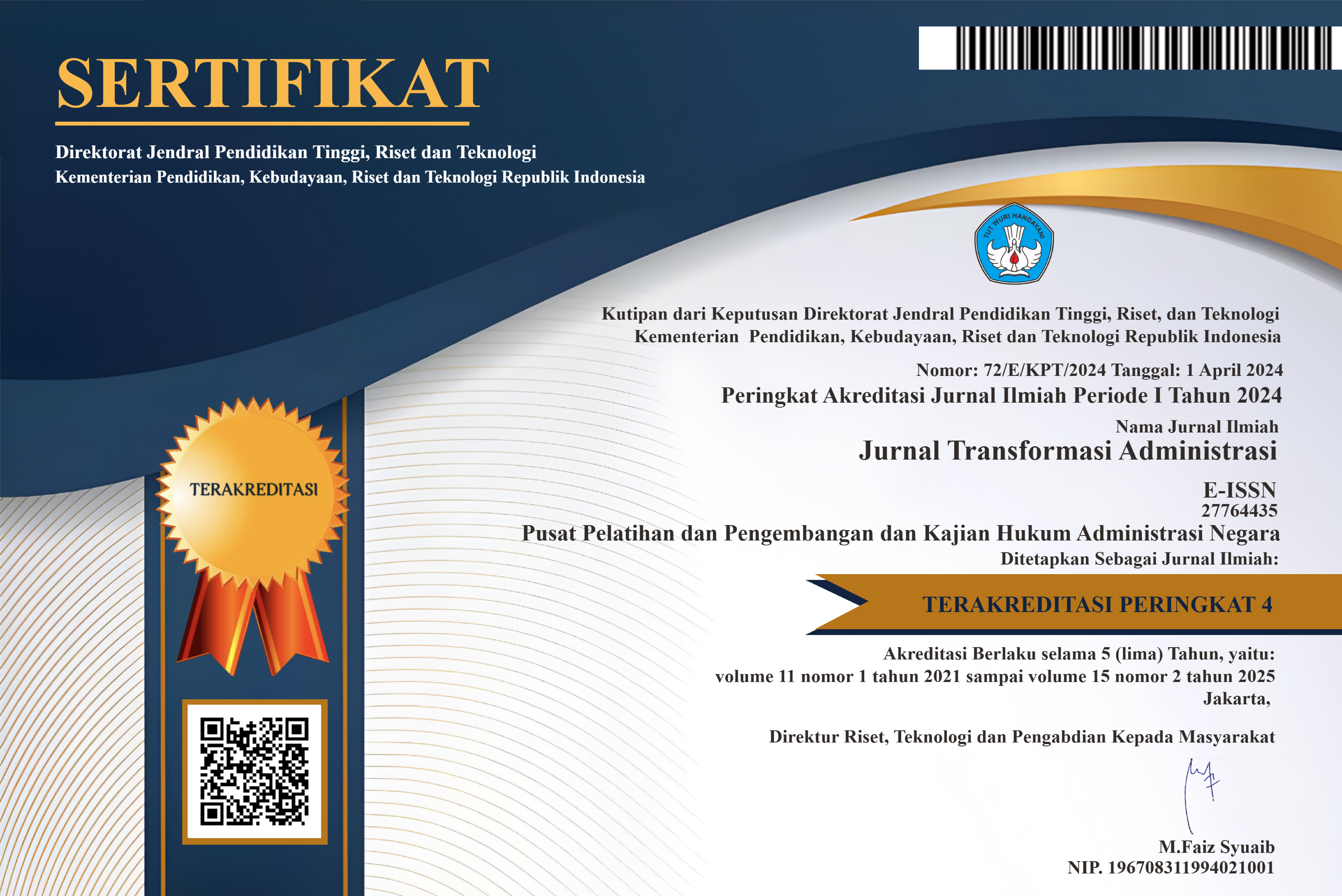Fostering Innovation in Government: Barriers and Strategies
Keywords:
innovation, government, leadership, culture, knowledgeAbstract
Innovation becomes a need in public service organizations. It enables the government to deliver more effective and efficient services. However, the development of innovation in government organization may encounter barriers. This study aims to identify the common barriers that hamper the development of innovation in government, especially in public service institutions. This study reviews academic articles that explore the problems and strategies in fostering innovation. The result shows that innovation encounter at least thirteen barriers both in the early stage and advanced stage of innovation development. The most common problems are weak leadership, the gap of understanding, and resistant culture. Leaders who are lack of innovation experience unable to motivate others to innovate. Further, the gap of understanding among worker may lead to lack of support on a certain innovation. An organization that resistance to change encounter difficulty to innovate. Thus, there are four steps that can be taken to push innovation in government; generating possibilities, incubating and prototyping, replication and scaling up, and analyzing and learning.
References
André, A., & Depauw, S. (2016). Too much choice , too little impact : A multilevel analysis of the contextual determinants of preference voting. West European Politics, 2382(April), 1–23. http://doi.org/10.1080/01402382.2016.1271596
Choi, T., & Chandler, S. M. (2015). Exploration, Exploitation, and Public Sector Innovation: An Organizational Learning Perspective for the Public Sector. Human Service Organizations Management, Leadership & Governance, 39(2), 139–151. http://doi.org/10.1080/23303131.2015.1011762
Crosby, B. C., Hart, P., & Torfing, J. (2016). Public value creation through collaborative innovation. Public Management Review, 1(0), 1–15. http://doi.org/10.1080/14719037.2016.1192165
Gobble, M. M. (2017). How Government Innovates. URTM, 59(2), 62–67. http://doi.org/10.1080/08956308.2015.1137188
Hambleton, R., & Howard, J. (2013). Place-Based Leadership and Public Service Innovation. Local Government Studies, 39(1), 47–70. http://doi.org/10.1080/03003930.2012.693076
Hartley, J. (2005). Innovation in Governance and Public Services: Past and Present. Public Money & Management, 25(1), 27–34. http://doi.org/10.1111/j.1467-9302.2005.00447.x
Martins, E. C., & Terblanche, F. (2003). Building organisational culture that stimulates creativity and innovation. European Journal of Innovation Management, 6(1), 64–74. http://doi.org/10.1108/14601060310456337
Meroño-Cerdán, A. L., & López-Nicolás, C. (2017). Innovation objectives as determinants of organizational innovations. Innovation, 19(2), 208–226. http://doi.org/10.1080/14479338.2016.1276407
Moore, M., & Hartley, J. (2017). Innovations in governance, 9037(July). http://doi.org/10.1080/14719030701763161
Munro, J. (2015). Accelerating innovation in local government. Public Money & Management, 35(3), 219–226. http://doi.org/10.1080/09540962.2015.1027498
Nählinder, J. (2013). Understanding innovation in a municipal context: A conceptual discussion. Innovation: Management, Policy and Practice, 15(3), 315–325. http://doi.org/10.5172/impp.2013.15.3.315
Newman, J., Raine, J., & Skelcher, C. (2010). Developments : Transforming Local Government : Innovation and Modernization. Public Money & Management, 21(61–68), 37–41. http://doi.org/10.1111/1467-9302.00262
Potts, J., & Kastelle, T. (2010). Public sector innovation research: What’s next? Innovation: Management, Policy and Practice, 12(2), 122–137.
http://doi.org/10.5172/impp.12.2.122
Putra, H.S . 2017. Different Perspective on Public Service Innovation in Indonesia. Proceeding International Seminar: Reconstructing Public Administration Reform To Build World Class Government. LAN
Ramstad, E. (2017). organisational perspective Expanding innovation system and policy, 2872(July). http://doi.org/10.1080/01442870903208551
Szczepańska-Woszczyna, K. (2015). Leadership and Organizational Culture as the Normative Influence of Top Management on Employee’s Behaviour in the Innovation Process. Procedia Economics and Finance, 34(15), 396–402. http://doi.org/10.1016/S2212-5671(15)01646-9















